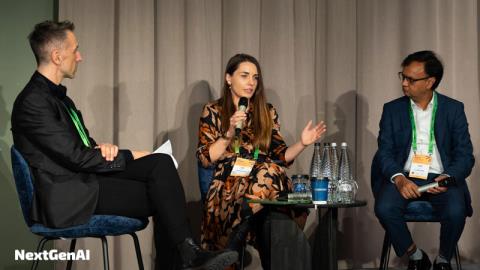During Finextra’s inaugural NextGen: AI event, Roberto Napolitano, the Chief Marketing Officer at Innovate Finance, steered a panel discussion titled ‘How do we deploy?’ featuring industry experts Sandra Blaga, Strategy and Innovation Manager for AI Delivery at NatWest, and Prashant Jajodia, Managing Partner and Financial Services Sector Lead at IBM.
Jajodia opened the dialogue by outlining three key applications of AI at IBM: implementing AI chatbots for seven of the top ten British banks, utilizing AI in the AskHR employee service system, and modernizing software development through AI applications.
Blaga underscored the necessity for business leaders to engage in AI-centered discussions, emphasizing that culture change within organizations is a significant endeavor. She detailed NatWest’s approach to AI adoption, which involves breaking governance down into manageable components to ensure comprehensive compliance, as well as investing in the upskilling and training of employees.
“With approximately 60,000 colleagues across the bank, we have a substantial opportunity to enhance AI knowledge within the UK workforce,” Blaga remarked. She further stressed the importance of transparent communication and ethical AI, noting that these principles must be integral to all use cases.
As the conversation shifted toward scaling AI initiatives, Jajodia highlighted IBM’s commitment to transitioning AI from theoretical models to real-world applications. He described an AI-powered complaints-handling agent that utilizes reliable data and has been successfully implemented at major banking institutions such as Lloyds and Nationwide Building Society. This technology handles customer complaints by analyzing and categorizing them, drafting responses for human review—showcasing a methodical approach to building trustworthy AI solutions.
Blaga pointed out the need to reformulate the narrative surrounding AI project delivery. She argued that amidst the immense excitement surrounding AI technologies, many leaders tend to focus on solutions and tools rather than the specific problems they aim to address. This lack of clarity can obscure the effectiveness of the initiatives undertaken.
“What I want us to focus on is the delivery narrative. Instead of discussing AI projects in isolation, we should consider them as part of broader business transformation endeavors enabled by AI. This may seem like a minor shift, but it has the potential to bridge the gap between business and technology teams,” she elaborated.
Napolitano supported this perspective, emphasizing that organizations should pursue generative AI not as a trend, but as a driver of innovation.
Addressing questions regarding AI training and its impact on employment, Jajodia stated, “It’s crucial for everyone to gain training in AI. While approximately 5% of jobs may be displaced by AI, another 5% could be created. However, the majority—around 90% of jobs—will experience transformation as AI becomes integrated into everyday tasks. Hence, it’s vital for individuals to learn how to leverage this technology.”
In conclusion, Napolitano remarked on the prevalence of AI and generative AI as buzzwords in recent times, predicting that “2025 will mark the true deployment of AI technologies.”
